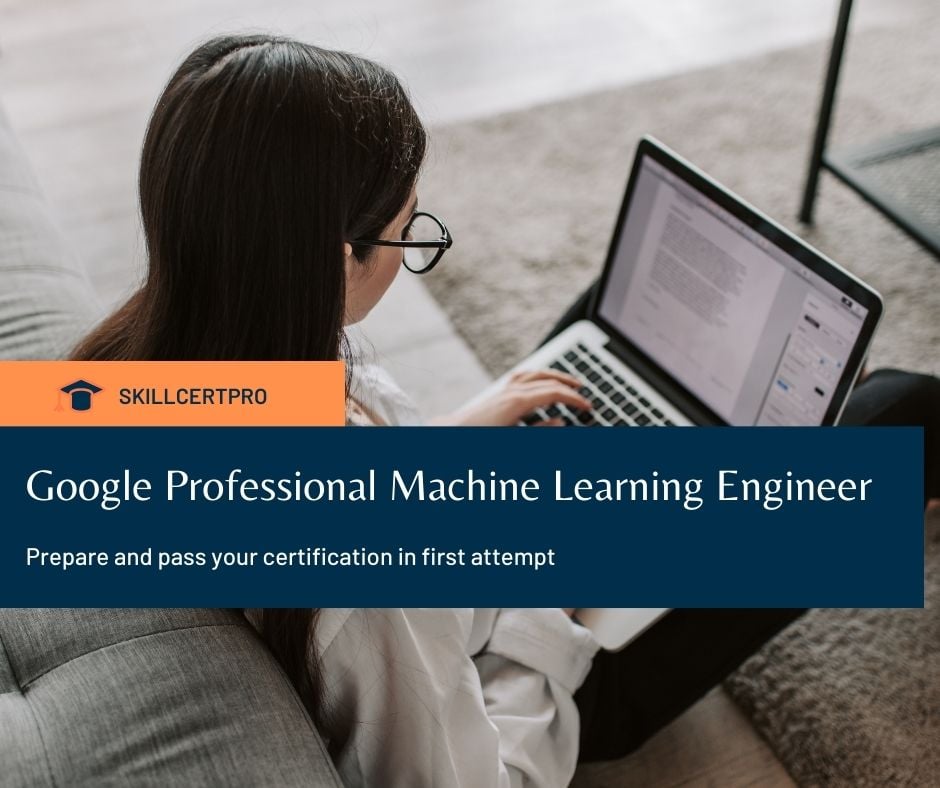Google Machine Learning Engineer Exam Questions 2025
- We are offering 655 latest real Google Machine Learning Engineer Exam Questions for practice, which will help you to score higher in your exam.
- Aim for above 85% or above in our mock exams before giving the main exam.
- Do review wrong & right answers and thoroughly go through explanations provided to each question which will help you understand the question.
- Master Cheat Sheet was prepared by instructors which contain personal notes of them for all exam objectives. Carefully written to help you all understand the topics easily.
- It is recommended to use the Master Cheat Sheet just before 2-3 days of the main exam to cram the important notes.
- Weekly updates: We have a dedicated team updating our question bank on a regular basis, based on the feedback of students on what appeared on the actual exam, as well as through external benchmarking.
A Professional Machine Learning Engineer designs, builds, and productionizes ML models to solve business challenges using Google Cloud technologies and knowledge of proven ML models and techniques. The ML Engineer considers responsible AI throughout the ML development process, and collaborates closely with other job roles to ensure long-term success of models. The ML Engineer should be proficient in all aspects of model architecture, data pipeline interaction, and metrics interpretation. The ML Engineer needs familiarity with foundational concepts of application development, infrastructure management, data engineering, and data governance. Through an understanding of training, retraining, deploying, scheduling, monitoring, and improving models, the ML Engineer designs and creates scalable solutions for optimal performance.
The Professional Machine Learning Engineer exam assesses your ability to:
-
Frame ML problems
-
Architect ML solutions
-
Design data preparation and processing systems
-
Develop ML models
-
Automate and orchestrate ML pipelines
-
Monitor, optimize, and maintain ML solutions
A Professional Machine Learning Engineer designs, builds, and productionizes ML models to solve business challenges using Google Cloud technologies and knowledge of proven ML models and techniques. The ML Engineer considers responsible AI throughout the ML development process, and collaborates closely with other job roles to ensure long-term success of models. The ML Engineer should be proficient in all aspects of model architecture, data pipeline interaction, and metrics interpretation. The ML Engineer needs familiarity with foundational concepts of application development, infrastructure management, data engineering, and data governance. Through an understanding of training, retraining, deploying, scheduling, monitoring, and improving models, the ML Engineer designs and creates scalable solutions for optimal performance.
Section 1: Framing ML problems
1.1 Translating business challenges into ML use cases. Considerations include:
- Choosing the best solution (ML vs. non-ML, custom vs. pre-packaged [e.g., AutoML, Vision API]) based on the business requirements
- Defining how the model output should be used to solve the business problem
- Deciding how incorrect results should be handled
- Identifying data sources (available vs. ideal)
1.2 Defining ML problems. Considerations include:
- Problem type (e.g., classification, regression, clustering)
- Outcome of model predictions
- Input (features) and predicted output format
1.3 Defining business success criteria. Considerations include:
- Alignment of ML success metrics to the business problem
- Key results
- Determining when a model is deemed unsuccessful
1.4 Identifying risks to feasibility of ML solutions. Considerations include:
- Assessing and communicating business impact
- Assessing ML solution readiness
- Assessing data readiness and potential limitations
- Aligning with Google’s Responsible AI practices (e.g., different biases)
Section 2: Architecting ML solutions
2.1 Designing reliable, scalable, and highly available ML solutions. Considerations include:
- Choosing appropriate ML services for the use case (e.g., Cloud Build, Kubeflow)
- Component types (e.g., data collection, data management)
- Exploration/analysis
- Feature engineering
- Logging/management
- Automation
- Orchestration
- Monitoring
- Serving
2.2 Choosing appropriate Google Cloud hardware components. Considerations include:
- Evaluation of compute and accelerator options (e.g., CPU, GPU, TPU, edge devices)
2.3 Designing architecture that complies with security concerns across sectors/industries.
Considerations include:
- Building secure ML systems (e.g., protecting against unintentional exploitation of data/model, hacking)
- Privacy implications of data usage and/or collection (e.g., handling sensitive data such as Personally Identifiable Information [PII] and Protected Health Information [PHI])
Section 3: Designing data preparation and processing systems
3.1 Exploring data (EDA). Considerations include:
- Visualization
- Statistical fundamentals at scale
- Evaluation of data quality and feasibility
- Establishing data constraints (e.g., TFDV)
3.2 Building data pipelines. Considerations include:
- Organizing and optimizing training datasets
- Data validation
- Handling missing data
- Handling outliers
- Data leakage
3.3 Creating input features (feature engineering). Considerations include:
- Ensuring consistent data pre-processing between training and serving
- Encoding structured data types
- Feature selection
- Class imbalance
- Feature crosses
- Transformations (TensorFlow Transform)
Section 4: Developing ML models
4.1 Building models. Considerations include:
- Choice of framework and model
- Modeling techniques given interpretability requirements
- Transfer learning
- Data augmentation
- Semi-supervised learning
- Model generalization and strategies to handle overfitting and underfitting
4.2 Training models. Considerations include:
- Ingestion of various file types into training (e.g., CSV, JSON, IMG, parquet or databases, Hadoop/Spark)
- Training a model as a job in different environments
- Hyperparameter tuning
- Tracking metrics during training
- Retraining/redeployment evaluation
4.3 Testing models. Considerations include:
- Unit tests for model training and serving
- Model performance against baselines, simpler models, and across the time dimension
- Model explainability on Vertex AI
4.4 Scaling model training and serving. Considerations include:
- Distributed training
- Scaling prediction service (e.g., Vertex AI Prediction, containerized serving)
Section 5: Automating and orchestrating ML pipelines
5.1 Designing and implementing training pipelines. Considerations include:
- Identification of components, parameters, triggers, and compute needs (e.g., Cloud Build, Cloud Run)
- Orchestration framework (e.g., Kubeflow Pipelines/Vertex AI Pipelines, Cloud Composer/Apache Airflow)
- Hybrid or multicloud strategies
- System design with TFX components/Kubeflow DSL
5.2 Implementing serving pipelines. Considerations include:
- Serving (online, batch, caching)
- Google Cloud serving options
- Testing for target performance
- Configuring trigger and pipeline schedules
5.3 Tracking and auditing metadata. Considerations include:
- Organizing and tracking experiments and pipeline runs
- Hooking into model and dataset versioning
- Model/dataset lineage
Section 6: Monitoring, optimizing, and maintaining ML solutions
6.1 Monitoring and troubleshooting ML solutions. Considerations include:
- Performance and business quality of ML model predictions
- Logging strategies
- Establishing continuous evaluation metrics (e.g., evaluation of drift or bias)
- Understanding Google Cloud permissions model
- Identification of appropriate retraining policy
- Common training and serving errors (TensorFlow)
- ML model failure and resulting biases
6.2 Tuning performance of ML solutions for training and serving in production.
Considerations include:
- Optimization and simplification of input pipeline for training
- Simplification techniques
About this certification Google Professional Machine Learning Engineer Exam Questions 2025
- Length: 2 hours
- Registration fee: $200 (plus tax where applicable)
- Language: English
- Exam format: Multiple choice and multiple select
- Exam delivery method:
- Take the online-proctored exam from a remote location, review the online testing requirements.
- Take the onsite-proctored exam at a testing center, locate a test center near you.
- Prerequisites: None
- Recommended experience: 3+ years of industry experience including 1+ years designing and managing solutions using GCP
For other Google Cloud Certifications. Please visit GCP Certifications










Verda Daniels –
Taking this practice test helped me a lot to clear the exam,questions were almost same but asked in different approach,but mastering this practice helps a lot Passed in first try.
Pierce Reynolds –
Excellent course, I just present my Google Machine learning few hours ago and passed it , thanks to Skillcertpro Practice Tests, wording in the exam is very similar to questions in skillcertpro tests, and some questions match almost completely, looking forward to take another Google Cert and 100% sure will buy a skillcertpro preparation course!!
Tonghong Chen –
Just started. From the first 10 questions, the solution and explanation have been super high quality and well written.
Valerie Windrow –
these practice exams were just perfect for the Google Machine Learning Engineer Exam preparations. Once you score above 90% in each test consistently you should pass the exam comfortably. 70% of my exam questions were almost identical in phrasing. Can 100% recommend to buy this course !
ljhh –
perfect
Geneva Silva –
I took all mock tests before my scheduled test, the questions are tougher than what the test gives but because you would have gone through these mock tests, the certification exam would be much easier to crack. All the best test takers!
Guilhem Baissus –
I just passed my certification and this content helped a lot. Like already mentioned, the questions are harder than the real test. Good luck !
Astrid Grant –
I used these practice tests along with the Official Study Guide after completing an online training course. This test feedback was extremely in-depth and helpful. I passed my exam this week at the 1st attempt, a many of the questions from here were in my real test too! Would really recommend. Thanks.